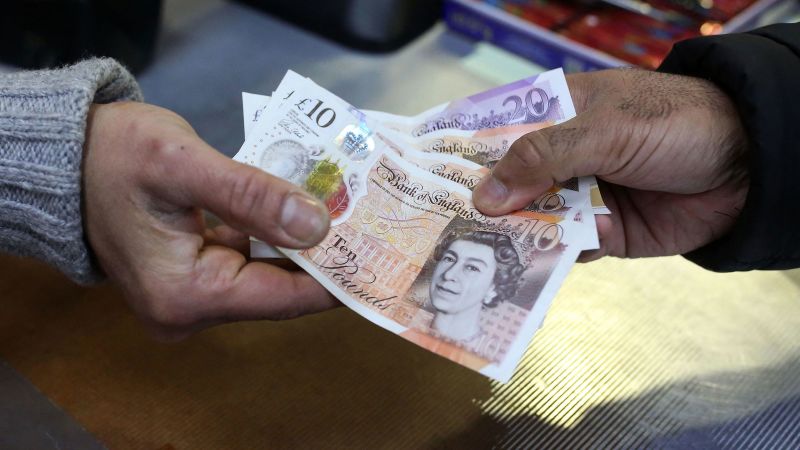- The Bank of England raised its benchmark interest rate to 5.25% despite a slowdown in consumer-price rises, leading to speculation about when the central bank will end its monetary tightening.
- House prices in Britain fell by 3.8% in July compared to the same month last year, the sharpest decline since July 2009, but the average house price was still higher than earlier this year.
- The Bank of Japan raised its cap on the yield of Japanese ten-year government bonds from 0.5% to 1%, causing the yield to soar to nine-year highs.
- Turkey's annual inflation rate increased to 47.8% in July, the first rise since October, due in part to a new tax on fuel.
- The euro area's economy grew by 0.3% in the second quarter, with much of the growth attributed to changes in intellectual property shifting by multinationals based in Ireland for tax purposes. Germany's GDP growth rate was zero, and Italy's fell by 0.3%.
Britain's public debt load has risen by more than 40% to nearly £2.6 trillion ($3.3 trillion) since the pandemic began, causing concerns about the country's ability to service its liabilities and reigniting questions about its credit rating. The heavy reliance on index-linked bonds and the threat of inflation could further worsen the situation, potentially leading to a negative economic spiral that could last for years. The UK's debt burden is already higher than its entire annual economic output, and without action, it could balloon to three times the GDP over the next half century.
Consumers have spent most of their excess savings from the Covid-19 pandemic, and this trend is expected to continue until the third quarter of 2023, potentially leading to a slowdown in economic growth and job market expansion.
UK PMI data suggests a 0.2% decline in GDP in Q3, indicating a potential recession as factory output slumps and the economy faces higher interest rates.
The steep increase in public debt worldwide due to the Global Financial Crisis and the COVID-19 pandemic is likely irreversible, as countries struggle to reduce debt-to-GDP ratios due to factors such as population aging and increased public financing needs, according to economists at the International Monetary Fund and the University of California, Berkeley.
Consumer spending is driving third-quarter GDP growth, but unsustainable spending habits, tightening lending standards, and the depletion of pandemic savings may lead to a decline in consumer spending in early 2024.
British factories in August experienced their weakest month since the start of the COVID-19 crisis due to shrinking orders caused by rising interest rates, according to a survey, resulting in a decline in purchasing activity, inventory holdings, and staffing levels. However, the slowdown in domestic and export demand has alleviated inflation pressures, potentially leading to a decrease in goods price inflation. With the economy showing signs of a slowdown, the Bank of England is expected to raise rates for the 15th consecutive time, despite concerns that it may lead to a recession.
Surging interest rates in the UK have led to a slump in factory output, the biggest annual drop in house prices since the global financial crisis, and signals of distress in different sectors of the economy, posing a dilemma for the Bank of England as it decides whether to raise interest rates further.
The UK economy has recovered more quickly from the pandemic than previously thought, outperforming Germany and other major Western industrial nations, although it still lags behind the G7 average, and there are concerns about the potential for a recession due to manufacturing struggles, sliding house prices, inflation, and strikes.
Revisions to economic data by the Office for National Statistics (ONS) have revealed that the UK economy was 0.6% larger at the end of 2021 than previously estimated, improving the country's performance relative to its peers in the G7. The revisions also highlight the impact of stockpiling in 2020 and indicate stronger growth in 2021, particularly in sectors such as wholesale trade and health services. However, while the revisions provide a more positive outlook, the UK's economic narrative remains relatively mediocre compared to pre-pandemic levels.
Wage growth in the UK has caught up with rising prices, resulting in real pay no longer falling, according to official figures, although the unemployment rate has risen and job vacancies have fallen. The data will also impact the state pension, which is set to increase by 8.5% next April.
British pay growth hits a record high, potentially leading the Bank of England to raise interest rates again, despite a cooling labor market with rising unemployment and falling job vacancies.
UK gross domestic product (GDP) fell by 0.5% in July, below expectations, with services output being the main drag on the economy, indicating a potential mild recession, and causing investment banks to revise down their growth forecasts; however, some experts still believe that the economy is growing, albeit at a slower pace.
Spain's post-COVID economic growth has exceeded expectations, with GDP rising by 5.8% in 2022 and 6.4% in 2021, higher than previous estimates, due to new economic data and challenges in measuring economic activity during the pandemic, according to the Institute of National Statistics (INE).
UK inflation is projected to average 7.2% in 2023, the highest rate among advanced economies, according to the Organisation for Economic Co-operation and Development (OECD), which also raised its forecast for UK inflation.
